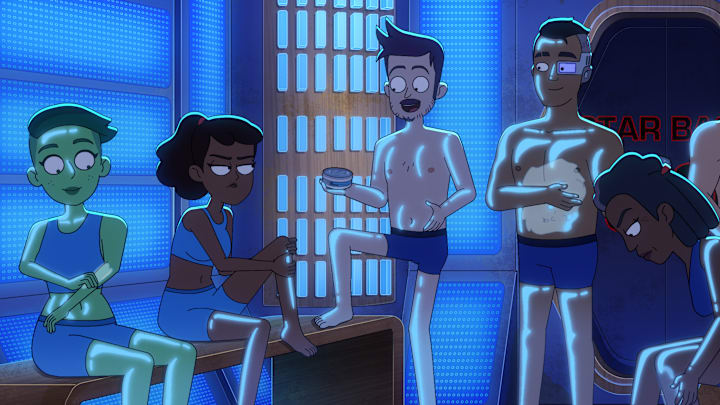Star Trek: Lower Decks is over. With it goes a strong cast of characters, imaginative aliens and worlds that animation excels at rendering, and a whole lot of references to earlier iterations of Star Trek. While Lower Decks has a good chance of becoming a beloved chapter in the Star Trek canon, its overreliance on callbacks clouds the show's unique identity.
The issue here is not references in themselves. Star Trek has frequently featured callbacks to past series and adventures. Doing this helps to remind us that this is all the same universe. It can also highlight the historical importance that a character like James T. Kirk holds in the world of Star Trek. The issue is when there is too much of it.
In Star Trek: The Next Generation, there was a general moratorium on referencing the Original Series for the first few seasons. Yes, there are legacy species, like Klingons, Vulcans, and Romulans, and they redid "The Naked Time" as "The Naked Now." On the whole, though, direct references are sparse, and TOS guest stars mostly appear later in the series.
The advantage of this approach to callbacks is that it keeps the focus on the current characters and their predicaments. Even if Riker has some similar traits to Kirk, for instance, the two are never directly compared in-universe. This makes sure we are engaged with what Riker is doing and not speculating how Kirk would do it. It also lets Riker not be like Kirk.
By contrast, Beckett Mariner explicitly compares herself to Kirk on several occasions in Lower Decks. This prompts the audience to actively compare and contrast Mariner and Kirk: How are they similar? How are they different? Is this meant to be a jab at Kirk? All of this distracts from what's happening in the show at hand and calls Mariner's character into question.
Mariner is a fascinating character whose multifaceted nuance makes her compelling on her own. Comparing her to Kirk not only risks offering a flawed interpretation of inarguably one of the main characters of the whole franchise, but it undermines the integrity and value of Mariner. We don't need to compare Mariner to Captain Kirk to like her, but the show invites us to.
Another thing is that the references can just get annoying. Sprinkling in an occasional reference to a character or story can make a scene feel special and remind us that this is all one, interconnected universe. Pouring multiple quotes and callbacks into every single episode is obnoxious.
Lower Decks does know how to do references well. In "wej Duj," T'Lyn quotes Spock from The Undiscovered Country by stating that "Logic is the beginning of wisdom, not the end." This was contextually relevant at the time, and it would make sense for Spock's insights into logic to have spread among various Vulcans over the course of the 90-ish years since he first said that.
This can be contrasted with "Starbase 80?!" another Lower Decks episode. In an episode filled with references, Boimler comments that he feels "like a total T'Pol" while covering himself in decontamination gel. The scene was already an obvious reference to Enterprise. Specifically naming T'Pol was unnecessary and it makes no in-universe for someone 200 years later to mention her.
Given its settings, costumes, and overall story structures, there can be very little doubt that Lower Decks is a Star Trek series. It has great characters, and its premise of following a ship that deals with the more mundane jobs in Starfleet is a opportunity for comedy, and they succeeded at that. Why then, do they have so many throwaway references?
For one thing, the references won't be understood by people who haven't seen these previous shows. By having so many references, it can change Lower Decks from a great entry point for new fans into a dense, confusing mess of in-jokes that requires being well-versed in hundreds of hours of television to fully appreciate.
These criticisms come from a place of love for both Lower Decks and Star Trek as a whole. So much about Lower Decks is fantastic. It just could have been even better if it let itself breathe and stand on its own, without always referencing what came before.
